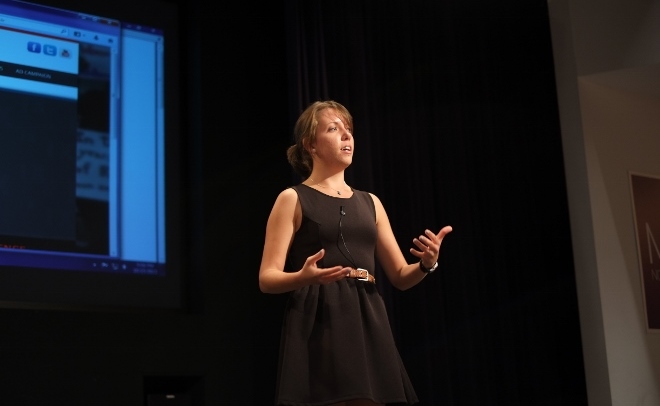
Angie Epifano spoke to students Tuesday night almost a year to the day after her account of her sexual assault published in The Amherst Student exposed critical faults in the sexual assault reporting and disciplinary system at Amherst College. In the McCormick Tribune Center, Epifano highlighted efforts on campuses nationwide to dismantle policy and cultural barriers that work against victims of rape and sexual assault. The speech, coordinated by Men Against Rape and Sexual Assault, was the first of a series of speeches Epifano has planned at colleges across the country.
“No one should ever feel unsafe at their school,” said Epifano. “But that is the environment that is often created.”
Epifano’s article described how Amherst College administrators committed her to a psychiatric ward after meetings with a college counselor. School officials nearly prevented her from coming back to campus and kept her from studying abroad over the summer. Epifano then withdrew from the college.
Before Epifano’s letter catalyzed activists across the country, Northwestern had already committed to reforming its policies regarding sexual assault. The Campus Coalition on Sexual Violence was formed in 2010 to assess the University’s sexual assault policies and services. In April 2012, President Morton Schapiro announced the creation of the Center for Awareness, Response and Education, which is dedicated to helping sexual assault victims find assistance in a confidential manner. Student groups such as Sexual Health and Assault Peer Educators and MARS have worked to combat the “rape culture” at Northwestern, including holding a discussion forum in the wake of Epifano's letter.
“There’s so much fear, and it’s so heartbreaking,” said Epifano. “We always put the blame on survivors; it’s victim blaming. We never look at the actual rapists themselves.”
Epifano’s speech centered on Title IX, which offers protection against gender- or sex-based discrimination on college campuses, and the Clery Act, legislation that requires colleges to publicly report all crime incidents (including sexual assault cases). Epifano argued that if used properly and more often, the legislation can bring schools into compliance and aid victims of sexual assault.
“When I was at Amherst, I was not given the option to change dorms,” said Epifano. “The dorm room I lived in looked exactly like the dorm room where I was raped, and I physically could not handle being in there .... Amherst not giving me the right to change rooms is a violation of Title IX.”
Since Epifano’s letter, Title IX claims have been filed at the University of North Carolina – Chapel Hill, Occidental College, Swarthmore College, Dartmouth College, the University of California – Berkeley and the University of South California. The claims, all related to sexual assault cases, resulted in investigations by the U.S. Department of Education.
Epifano argued that schools have not disclosed all reported instances of sexual assault, as mandated by the Clery Act.
“The University of Georgia … will say it has zero rapes on its entire campus, zero sexually violent acts on its entire campus,” said Epifano. “That’s because they won’t admit that it’s happened. That’s illegal. It’s flat-out lying to students.”
After the speech, Epifano stressed the importance of changing college culture regarding sexual assault.
“You have to get into college campuses and get students involved,” Epifano said. “Once you get that base, other people begin to take notice.”